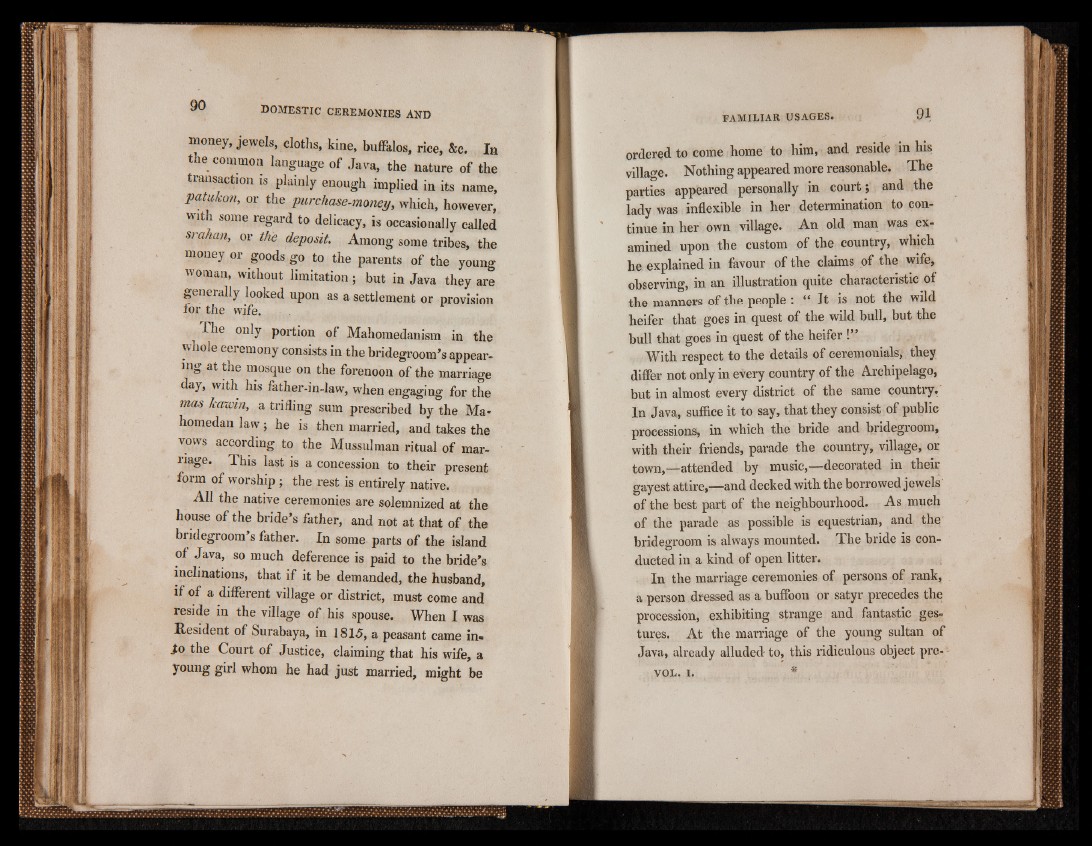
money, jewels, cloths, kine, buffalos, rice, &c. In
the common language of Java, the nature of the
transaction is plainly enough implied in its name,
patukon, or the purchase-money, which, however,
with some regard to delicacy, is occasionally called
srahan, or the deposit. Among some tribes, the
money or goods go to the parents of the young
woman, without limitation ; but in Java they are
generally looked upon as a settlement or provision
for the wife.
The only portion of Mahomedanism in the
whole ceremony consists in the bridegroom’s appear-
mg at the mosque on the forenoon of the marriage
day, with his father-in-law, when engaging for the
mas a trifling sum prescribed by the Mahomedan
law; he is then married, and takes the
vows according to the Mussulman ritual of marriage.
This last is a concession to their present
form of worship; the rest is entirely native.
Ail the native ceremonies are solemnized at the
house of the bride’s father, and not at that of the
bridegroom’s father. In some parts of the island
of Java, so much deference is paid to the bride’s
inclinations, that if it be demanded, the husband,
if of a different village or district, must come and
reside in the village of his spouse. When I was
Resident of Surabaya, in 1815, a peasant came in«
Jo the Court of Justice, claiming that his wife, a
young girl whom he had just married, might be
ordered to come home to him, * and reside in his
village. Nothing appeared more reasonable. The
parties appeared personally in court; and the
lady was inflexible in her determination to continue
in her own village. An old man was examined
upon the custom of the country, which
he explained in favour of the claims of the wife,
observing, in an illustration quite characteristic of
the manners of the people : “ It is not the wild
heifer that goes in quest of the wild bull, but the
bull that goes in quest of the heifer !”
With respect to the details of ceremonials, they
differ not only in every country of the Archipelago,
but in almost every district of the same country.
In Java, suffice it to say, that they consist of public
processions, in which the bride and bridegroom,
with their friends, parade the country, village, or
town,—attended by music,—decorated in their
gayest attire,—and decked with the borrowed jewels
of the best part of the neighbourhood. As much
of the parade as possible is equestrian, and the
bridegroom is always mounted. The bride is conducted
in a kind of open litter.
In the marriage ceremonies of persons of rank,
a person dressed as a buffoon or satyr precedes the
procession, exhibiting strange and fantastic gestures.
At the marriage of the young sultan of
Java, already alluded- to, this ridiculous object prc-
v o l . 1 . *